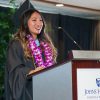Editor’s Note: The following edited speech was given by Stephanie Liu, who graduated with a master of science in education, at Destination Graduation on June 10 in Las Vegas.
I am a proud kindergarten teacher. Working with children has strengthened my belief in the power of education, and what it can do for a child. But I started my journey teaching history to middle school and high schoolers.
I remember working with one student in particular. Her name was Keyala. She was outgoing, full of life, and had a smile that could light up a room. But every time she left my class, I saw the smile fade. I started questioning my effectiveness as a teacher. Soon after, though, I realized that Keyala liked history. She just couldn’t read at grade level. So I had her tested. When the results came back, I was frustrated, sad, and shocked. How could our education system promote a seventh-grader who could read only at a second grade level?
I wasn’t qualified to teach reading, so instead I helped her cultivate a sense of grit. By teaching her perseverance through difficult challenges, Keyala’s confidence and enthusiasm soared when it came time to reading materials in our history class. This was the moment I realized the value of the education that I was receiving through the master’s program at the John Hopkins School of Education. I never would have thought of teaching Keyala about perseverance if it were not for our curriculum aligning with my experiences in the classroom.
Working in Hawai’I, I have been exposed to not only a rich culture, but a beautiful language. A word that has deeply resonated with me is ahonui. Its literal meaning is “deep breath,” but it’s also understood to mean patience and perseverance. I think of this word when I think of Keyala. It grounds me. It has taught me that progress in any endeavor requires not only patience and perseverance, but humility and respect.
We teach for the Keyalas of the world. We do it because we believe in educational equity. We live it because it is our kuleana, privilege and responsibility to work with the future leaders of the world. As you continue in this work, lean on the words of Dr. Martin Luther King, Jr.: “The function of education is to teach one to think intensively and to think critically. Intelligence plus character—that is the goal of true education.”

